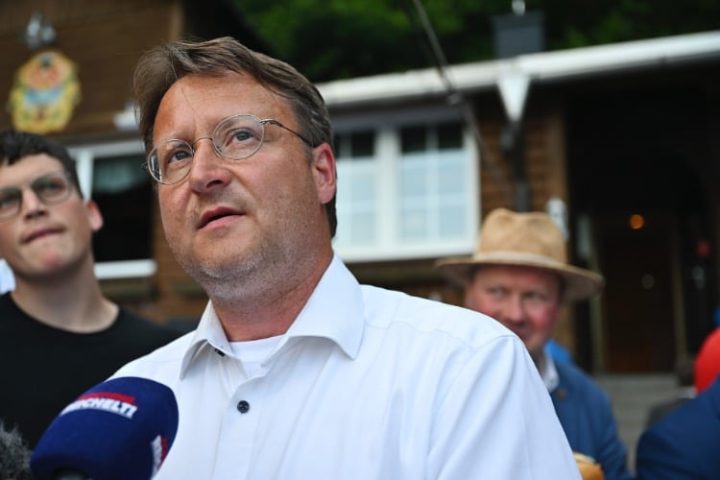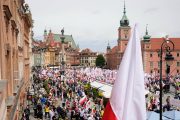
Recent German national polls have witnessed the populist-conservative Alternative für Deutschland (Alternative for Germany, AfD) rising in popularity to become the second-largest party in the country, surpassing every member of the ruling government coalition, including the Social Democrats, the party of current German Chancellor Olaf Scholz.
In turn, leaders from Germany’s five establishment parties — SPD, Greens, FDP, CDU, and the Left — urged their voters not to support the AfD candidate in a runoff election after Robert Sesselmann’s victory in the district election in Sonneberg in southern Thuringia on Sunday, June 11. Consequently, Sesselmann won 46.7 percent of the vote, failing to reach the absolute majority required to win outright.
With Sesselman poised to become his party’s first district administrator in Germany, Thuringia’s mainstream parties rallied around state parliamentarian Jürgen Köpper (CDU), who gathered 35.7 percent of the first-round vote, as per the Berlin-based newspaper Der Spiegel.
Notably, Thuringia’s FDP leader Thomas Kemmerich lambasted the June 11 election result as “not good for the district,” before pledging that he would rally for his party’s supporters to vote for Köpper in the second round: “The goal in the second round of voting should be to mobilize the more than 50 percent of non-voters to make the result in favor of the CDU candidate, Jürgen Köpper, positive for the district.”
Thuringia’s Minister President Bodo Ramelow (Left Party), who helms the state’s red-red-green minority government, which also depends on the collaboration of the CDU and FDP, expressed his disappointment with the voter turnout of 49.1 percent: “Half of those who didn’t go also bear some of the responsibility for the fact that the AfD candidate got 50 percent almost immediately.”
Ramelow urged Sonnebergers to vote in the runoff election, failing which, a candidate “who dislikes foreigners and wants to get out of the euro” could triumph, he said to the press.
Moreover, Hans-Georg Maasen, who previously served as president of Germany’s Federal Office for the Protection of the Constitution (BfV), argued in a Twitter post that by cooperating with left-liberals from the SPD, the Left, and Greens in Thuringia, the CDU was enhancing the AfD’s position in Sonneberg.
The German Institute for Human Rights claimed the AfD aimed to “eliminate the free democratic basic order,” and went on to allege, “It aims to abolish the guarantee of human dignity enshrined in Article 1 (1) of the Basic Law.”
Notably, the head of the BfV, Thomas Haldenwang, went even further by blatantly cautioning Germans not to vote for the AfD, claiming the party had elements within it that ran contrary to the German constitution, a report from Der Spiegel states.
During an interview with broadcaster ZDF, Haldenwang said:
We actually see strong currents in the AfD that act anti-constitutionally. And this is particularly about hatred and agitation against minorities of all kinds, minorities, migrants, Muslims, but also people with a different sexual orientation.This makes it all the more important that we educate people about this party and its aspirations, about what constitutes the danger of this party for our democracy, for our liberal basic order … The fight for our democracy must be waged in society as a whole.
Regarding Haldenwang’s remarks, AfD member of the German Bundestag Petr Bystron commented in an interview with The European Conservative: “In his latest comments on public TV, Haldenwang dropped the mask off his face. He publicly admitted that he is trying to discredit the AfD.”
“It confirms that this secret service, which is led by the Interior Ministry, is being used for the oppression of the opposition in Germany,” Bystron continued.
Björn Höcke, the leader of the AfD in the region of Thuringia, lauded the district’s election results, writing on Twitter:
“With almost 47 percent, my parliamentary colleague Robert Sesselmann was able to achieve the best AfD result in the first round of a district election. Had he received three percentage points more, he would have become the first AfD district administrator. We want and will do that for Thuringia.”
Besides, Kristin Brinker, the AfD’s group leader in Berlin’s state parliament, expressed her opinions about the importance of the election, saying, “The district election of Sonneberg has shown that it is only a matter of time before the AfD is elected to responsibility. We will continue to make history.”
In nearby Hungary, globalist opposition parties also gathered together to challenge Prime Minister Viktor Orbán’s Fidesz party during Hungary’s national parliamentary elections in 2022. Several globalist parties sought to brush their ideological disparities under the carpet and united to attempt to unseat Orbán’s Fidesz.
Likewise, observers contend that Germany’s AfD may experience treatment similar to Hungary’s Fidesz from the Left, SPD, Greens, FDP, and CDU as the party increases in popularity both on the state and federal levels.
Just days ago, the AfD published a motion unveiling its party program for next year’s European election campaign, urging for the “orderly dissolution of the European Union,” maintaining that the supranational alliance is totally unreformable at the current moment.
“Our patience with the EU is exhausted. We are therefore striving for the orderly dissolution of the EU and want to found a new European economic and interest community instead, a federation of European nations. The EU project failed,” the leading motion of the Federal Program Commission for the European elections program read.
The motion elaborated by stating that the “EU and the globalist elites supporting it” have ditched the “original idea of the founding fathers of a European community” many years ago. Additionally, the motion posited that the EU has “developed into an undemocratic construct” that is increasingly governed by a “non-transparent, uncontrolled bureaucracy.” The institution, therefore, is no longer “reformable,” according to the AfD’s leadership.
Going a step further, the AfD urged for the abolishment of the European Parliament. “Until the situation is reorganized,” legislative competencies should be given exclusively to the European Council of Member States, which comprises the heads of government of the 27 EU member states. However, European Council members should “have to be bound by the decisions of national parliaments,” the motion proposed.
The AfD also argued in favor of using national referendums for “decisions on all fundamental EU issues,” including the topic of whether Germany should remain in the EU. The aforementioned motion by the AfD also suggested an abandonment of the euro and the use of national currencies instead.
If the status quo is maintained and the EU continues operating in its present form, the AfD’s leadership pledged that the party would continue challenging “restrictions on national sovereignty and further redistribution of wealth and assets of our citizens through EU regulations.”
Alluding to Germany’ ties with Russia, AfD bosses admitted that Russian actions in Ukraine have “created a lot of suffering among those affected,” but posited that the end of the Russo-Ukrainian conflict must be achieved “with diplomatic means.” The party also proposed that “undisturbed trade with Russia” be rejuvenated, economic sanctions to be lifted, and for the Nord Stream gas pipelines to be fixed.
The next European elections are poised to happen June 6-9, 2024. If the AfD can sustain its current support level, which stands at about 19-20 percent nationally, as it heads into next year’s elections, it could see the number of its MEPs nearly double.
The party’s rise in popularity has come despite several attempts by the leftist-controlled German media to undermine AfD members targeted by the German domestic spy agency, the Federal Office for the Protection of the Constitution (BfV).
Haldenwang took helm of the BfV in 2018, replacing the former chief Hans-Georg Maassen. Maassen was sacked after he contradicted claims of “migrant hunts” during protests in the city of Chemnitz in response to the killing of local Daniel Hillig, who was stabbed to death by Syrian asylum seeker Alaa Sheikhi.
The former BfV head was also slammed for having sympathies for the AfD by former government spokesman Steffen Seibert.
Since Haldenwang assumed the BfV leadership, the spy agency has adopted a more hostile stance toward AfD members, such as monitoring many AfD members in 2019, including firebrand Thuringia leader Björn Höcke and the party’s entire youth wing, the Junge Alternative (JA).
Haldenwang stated at the time that members of the JA had “clear evidence of an anti-immigration and particularly anti-Muslim attitude,” and the BfV added that it planned to keep the entire party as a ”subject of investigation.”
The comments from the spy chief came just weeks after a key government-funded think tank called for the AfD to be banned outright.
While the next German Federal election is set to take place on or before October 26, 2025, AfD co-leader Alice Weidel was confident that the Christian Democratic Union (CDU) would not exclude possibilities of working with the AfD moving forward. Weidel also defended Höcke against BfV accusations and Haldenwang saying, “Mr. Höcke is not a right-wing extremist.”



